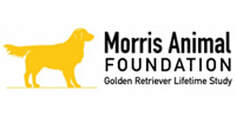Please keep the following in mind...
- A reputable breeder will have a Sales Contract describing the terms, conditions and any guarantees regarding the puppy.
- A breeder should willingly supply you with copies of Hip, Elbow, Eye and Heart clearances on BOTH PARENTS.
- They should provide you with the worming and vaccinations the puppy has had and what kind of food and how much to feed.
If the breeder cannot or will not give you this information, THINK TWICE ABOUT BUYING A PUPPY FROM THIS PERSON! Do not accept any excuses, there are NONE. If someone truly cares about Goldens they will get these clearances on the dogs they are breeding and be happy to supply you with copies. If they don't, they may not know enough to be able to help you if you run into problems down the road.
Before you fall in love with the first adorable Golden face you see, take the time in an initial phone call to ask the questions listed below. You may not find a breeder who fits 100% of these criteria, but if you receive more than two negative responses, consider another breeder. Reputable breeders welcome questions. It helps them to know that you are serious about taking care of your new family member and will look out for its best interest. If a breeder gets upset with all the questions, or doesn't want to answer your questions, please consider finding another breeder.

